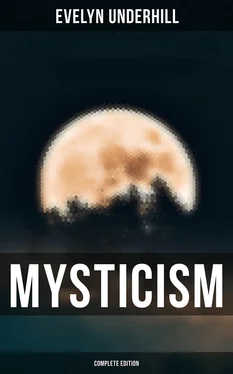Evelyn Underhill
MYSTICISM
(Complete Edition)
Published by

Books
- Advanced Digital Solutions & High-Quality eBook Formatting -
musaicumbooks@okpublishing.info
2018 OK Publishing
ISBN 978-80-272-4677-9
Table of Contents
Preface
Part I The Mystic Fact
Chapter 1 The Point of Departure
Chapter 2 Mysticism and Vitalism
Chapter 3 Mysticism and Psychology
Chapter 4 The Characteristics of Mysticism
Chapter 5 Mysticism and Theology
Chapter 6 Mysticism and Symbolism
Chapter 7 Mysticism and Magic
Part II The Mystic Way
Chapter 1 Introductory
Chapter 2 The Awakening of the Self
Chapter 3 The Purification of the Self
Chapter 4 The Illumination of the Self
Chapter 5 Voices and Visions
Chapter 6 Introversion, Part I. Recollection and Qui
Chapter 7 Introversion. Part II. Contemplation
Chapter 8 Ecstacy and Rapture
Chapter 9 The Dark Night of the Soul
Chapter 10 The Unitive Life
Conclusion
Historical Sketch of Mysticism (Appendix)
Bibliography & Bibliographical Note
Table of Contents
This book falls naturally into two parts; each of which is really complete in itself, though they are in a sense complementary to one another. Whilst the second and longest part contains a somewhat detailed study of the nature and development of man’s spiritual or mystical consciousness, the first is intended rather to provide an introduction to the general subject of mysticism. Exhibiting it by turns from the point of view of metaphysics, psychology, and symbolism, it is an attempt to gather between the covers of one volume information at present scattered amongst many monographs and text-books written in divers tongues, and to give the student in a compact form at least the elementary facts in regard to each of those subjects which are most closely connected with the study of the mystics.
Those mystics, properly speaking, can only be studied in their works: works which are for the most part left unread by those who now talk much about mysticism. Certainly the general reader has this excuse, that the masterpieces of mystical literature, full of strange beauties though they be, offer considerable difficulties to those who come to them unprepared. In the first seven chapters of this book I have tried to remove a few of these difficulties; to provide the necessary preparation; and to exhibit the relation in which mysticism stands to other forms of life. If, then, the readers of this section are enabled by it to come to the encounter of mystical literature with a greater power of sympathetic comprehension than they previously possessed, it will have served the purpose for which it has been composed.
It is probable that almost every such reader, according to the angle from which he approaches the subject, will here find a good deal which seems to him superfluous. But different types of mind will find this unnecessary elaboration in different places. The psychologist, approaching from the scientific standpoint, eager for morbid phenomena, has little use for disquisitions on symbolism, religious or other. The symbolist, approaching from the artistic standpoint, seldom admires the proceedings of psychology. I believe, however, that none who wish to obtain an idea of mysticism in its wholeness, as a form of life, can afford to neglect any of the aspects on which these pages venture to touch. The metaphysician and the psychologist are unwise if they do not consider the light thrown upon the ideas of the mystics by their attitude towards orthodox theology. The theologian is still more unwise if he refuse to hear the evidence of psychology. For the benefit of those whose interest in mysticism is chiefly literary, and who may care to be provided with a clue to the symbolic and allegorical element in the writings of the contemplatives, a short section on those symbols of which they most often make use has been added. Finally, the persistence amongst us of the false opinion which confuses mysticism with occult philosophy and psychic phenomena, has made it necessary to deal with the vital distinction which exists between it and every form of magic.
Specialists in any of these great departments of knowledge will probably be disgusted by the elementary and superficial manner in which their specific sciences are here treated. But this book does not venture to address itself to specialists. From those who are already fully conversant with the matters touched upon, it asks the indulgence which really kindhearted adults are always ready to extend towards the efforts of youth. Philosophers are earnestly advised to pass over the first two chapters, and theologians to practise the same charity in respect of the section dealing with their science.
The giving of merely historical information is no part of the present plan: except in so far as chronology has a bearing upon the most fascinating of all histories, the history of the spirit of man. Many books upon mysticism have been based on the historical method: amongst them two such very different works as Vaughan’s supercilious and unworthy “Hours with the Mystics” and Dr. Inge’s scholarly Bampton lectures. It is a method which seems to be open to some objection: since mysticism avowedly deals with the individual not as he stands in relation to the civilization of his time, but as he stands in relation to truths that are timeless. All mystics, said Saint-Martin, speak the same language and come from the same country. As against that fact, the place which they happen to occupy in the kingdom of this world matters little. Nevertheless, those who are unfamiliar with the history of mysticism properly so called, and to whom the names of the great contemplatives convey no accurate suggestion of period or nationality, may be glad to have a short statement of their order in time and distribution in space. Also, some knowledge of the genealogy of mysticism is desirable if we are to distinguish the original contributions of each individual from the mass of speculation and statement which he inherits from the past. Those entirely unacquainted with these matters may find it helpful to glance at the Appendix before proceeding to the body of the work; since few things are more disagreeable than the constant encounter of persons to whom we have not been introduced.
The second part of the book, for which the first seven chapters are intended to provide a preparation, is avowedly psychological. It is an attempt to set out and justify a definite theory of the nature of man’s mystical consciousness: the necessary stages of organic growth through which the typical mystic passes, the state of equilibrium towards which he tends. Each of these stages — and also the characteristically mystical and still largely mysterious experiences of visions and voices, contemplation and ecstasy — though viewed from the standpoint of psychology, is illustrated from the lives of the mystics; and where possible in their own words. In planning these chapters I have been considerably helped by M. Delacroix’s brilliant “Etudes sur le Mysticisme,” though unable to accept his conclusions: and here gladly take the opportunity of acknowledging my debt to him and also to Baron von Hügel’s classic “Mystical Element of Religion.” This book, which only came into my hands when my own was planned and partly written, has since been a constant source of stimulus and encouragement.
Finally, it is perhaps well to say something as to the exact sense in which the term “mysticism” is here understood. One of the most abused words in the English language, it has been used in different and often mutually exclusive senses by religion, poetry, and philosophy: has been claimed as an excuse for every kind of occultism, for dilute transcendentalism, vapid symbolism, religious or aesthetic sentimentality, and bad metaphysics. On the other hand, it has been freely employed as a term of contempt by those who have criticized these things. It is much to be hoped that it may be restored sooner or later to its old meaning, as the science or art of the spiritual life.
Читать дальше













